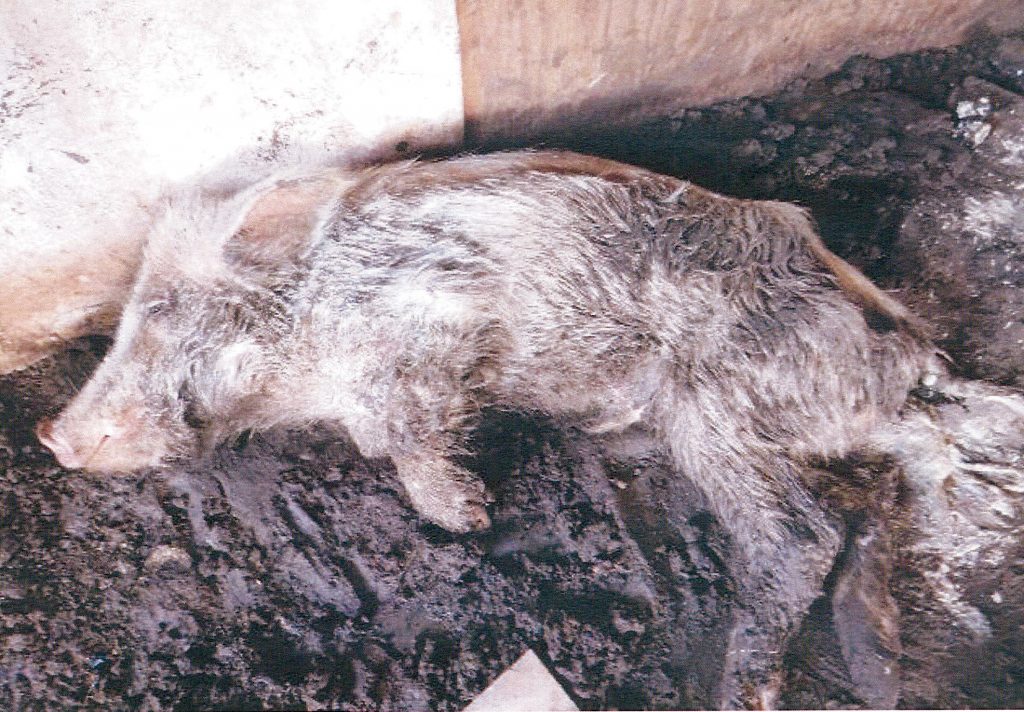
WINNSBORO – Another high-profile animal cruelty case in Fairfield County has resulted in either a reduced sentence or outright dismissal. The public will never know which, since it was shut out of the judicial process of the case entirely.
Randy Newman, solicitor for the sixth judicial circuit case, declined to comment.
“This matter is no longer of public record,” Newman said via email, “and we are unable to comment further on this case.
In March 2017, the Fairfield County Sheriff’s Office charged Lirhonda Butler, 42, with ‘Ill Treatment of Animals’ in the starvation death of a pig in her care.
According to the initial incident report, the veterinarian called to the scene stated the pig’s extremely poor condition was the result of neglect and cruelty.
Instead of being charged under the felony section of the ‘Ill Treatment’ statute, however, Butler was charged under the misdemeanor section.
Records No Longer Available
The Voice learned about the case more than two months after Butler’s arrest. The newspaper initially hit several road blocks as it sought access to the incident report and Butler’s mug shot through normal county channels. That information was eventually released in June, 2017, in response to a Freedom of Information request by The Voice. However, the records made public at that time, no longer appear in law enforcement and court records. The Voice learned last month that the online court records no longer state whether or not Butler’s case is still active.

The case was last known to be active as of Sept. 12, 2019. At the time, Newman told The Voice he expected the case to reach a resolution by the end of 2019, almost three years after Butler was charged.
Case is Expunged
Official sources not authorized to talk about the case, confirmed to The Voice earlier this month that Butler’s case was expunged in December, 2019.
Records may be removed from public view by an order of expungement issued by a judge.
Only certain cases qualify for expungement, such as misdemeanors, youthful offenders and other minor cases. Defendants seeking expungement must apply to the solicitor’s office.
Applicants must pay a $250 administrative fee to the Solicitor’s office, $25 to the South Carolina Law Enforcement Division (“SLED”), and a $35 filing fee to the Clerk of Court, according to the S.C. Judicial Department.
Butler hired a high profile Columbia defense attorney to represent her, and It doesn’t appear the case ever came before a judge.
If convicted for a first offense under the misdemeanor section of the ‘Ill Treatment of Animals’ statute, section 47-1-40 (A), Butler faced imprisonment not exceeding 90 days or a fine of not less than $100 nor more than $1,000, or both. If she had been charged with a felony and convicted under section (B) of the statute, she would have faced punishment by imprisonment of not less than 180 days and not to exceed 5 years and a fine of $5,000.
“Deplorable Conditions”
On March 24, 2017 a Fairfield County sheriff’s deputy, acting on a telephone tip, found a pig underweight and essentially motionless in the mud floor of a storeroom on a sprawling property on Richtex Road in Fairfield County.
The only access to the storeroom was a window. The door to the storeroom was boarded over and secured with screws from the inside of the room, according to the incident report. Looking through the window, the deputy reported the condition of the pig as laying in deep mud and feces with no food or potable water in the room.
“The pig was laying in the far right corner [of the room] and could not get up,” the report said. “A metal drum cut in half contained rusty water with algae present – “very polluted,” the deputy’s report stated.
“The pig was not moving, but making noises,” said Fairfield County Animal Control Director Bob Innes who was called to the scene by the deputy. “He [the pig] looked to be suffering and dying, Innes stated on the report.”
When Butler arrived a few moments later, she reportedly told officers on the scene that she had owned the pig since he was nine weeks old. She said the pig had been in that condition for two days, the deputy reported.
Innes asked if she had called a veterinarian.
“What for?” Butler asked, according to the report.
Innes and a second deputy who had also arrived at the storeroom explained to Butler that the pig needed to be taken away to receive treatment. The report said the woman initially refused to let anyone enter the storeroom until she spoke to an attorney, but allowed officers to enter a few minutes later.
Since the doorway to the area where the pig was located was boarded up, deputies entered by crawling through a window. Once inside, they described the pig’s condition as “deplorable,” the report said.
“There were pieces of boards with protruding nails lay[ing] in the mud,” the report stated.
An old paint bucket, pieces of cement blocks and a metal pipe lay in the mud as well, according to the report.
A veterinarian who arrived at the scene to evaluate the animal said it appeared to be a case of ‘pure neglect’ and that it would cost at least $3,000 to treat the pig.
At that point, Butler decided to allow the pig to be euthanized.
Her grandfather reportedly shot the pig twice but did not kill it. The veterinarian then euthanized the pig with a single shot to the head.
In a subsequent written report, the veterinarian wrote that the body score of the severely malnourished pig was a ‘1’ on a scale of 1-5.
“This indicates severe starvation,” the veterinarian wrote. “The hog was unable to rise, had severe white dysentery, subnormal body temperature and dehydration. This indicates prolonged starvation [from] at least three to four weeks to two months,”
The one-year-old pig weighed approximately 120 pounds and should have weighed about 300 pounds, the veterinarian wrote.
Asked why the charge was a misdemeanor and not a felony, Fairfield County Sheriff Will Montgomery said he consulted with Newman about the charge and that Newman made the decision that it was a misdemeanor.
Montgomery has lingering questions about the charge.
“I was going to go back and look at it again,” he said, pausing. “But now it’s too late,” he told The Voice.
Expert Opinion
Joe Berry, a former Richland County prosecutor, said he tried at least 39 animal abuse cases while he served as a solicitor and obtained convictions in 17 of them.
Berry declined to comment on the Butler case, noting that he’s not involved in that case or other Fairfield County cases.
He did say that, typically, animal abuse cases resulting in death—either directly or through euthanasia—meet the threshold of the felony offense section of the ‘Ill Treatment of Animals’ statute.
“As a general rule, if the animal dies, then it’s going to be a felony,” Berry said. ”The statute says it’s a felony if you “torture, kill, or maim’ and when it ‘causes excessive pain and suffering.’ If it’s a misdemeanor, it just says ‘causes pain and suffering.’ When the animal dies, that’s excessive pain in my book,” he said.
Butler did not have any prior criminal convictions, but in July 2017 a judgment for $20,437.41 was entered against her in civil court, according to the Fairfield County Public Index.
Light sentences for animal abusers
If past Fairfield County animal abuse cases prosecuted by Newman are a predictor, chances are good that animal abuse-related offenders will be allowed to plea for reduced punishment and receive probation. Even felony animal abuse charges are typically plea-bargained to misdemeanors. Many times, charges are dropped altogether by Newman, according to court documents.
Expungement of the Butler case is the latest in a series of severe animal abuse cases in Fairfield County resulting in light sentences or no sentence at all.
In 2018, an investigation by The Voice found that at least 15 animal abuse cases that came to Newman for prosecution between 2015-2018 resulted in lighter sentences or were dismissed outright. Many of those cases resulted in the animal’s death. Generally, the investigation showed, perpetrators of animal abuse in Fairfield County don’t go to jail. Or, as in Butler’s case, are expunged.
Jay Bender, an attorney with the S.C. Press Association, of which The Voice is a member, said expungement typically occurs in one of two circumstances. The first happens when the prosecuting attorney [solicitor] chooses not to prosecute; the other occurs if the defendant successfully completes a pre-trial intervention or diversion program.
“In those circumstances the record can be expunged,” Bender said. “But that doesn’t mean it didn’t happen.”
Barbara Ball contributed to this story.











